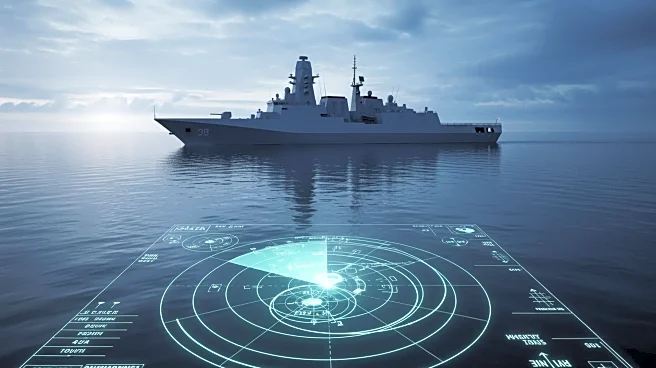What's Happening?
The United Kingdom's Ministry of Defence announced that a UK patrol ship, HMS Severn, intercepted a Russian corvette, RFN Stoikiy, and a tanker, Yelnya, as they navigated through the English Channel. This
interception is part of a broader increase in Russian naval activity around UK waters, which has surged by 30% over the past two years. The HMS Severn shadowed the Russian vessels before handing over monitoring duties to a NATO ally off the coast of Brittany. Additionally, Britain has deployed three Poseidon surveillance aircraft to Iceland as part of a NATO mission to patrol for Russian ships and submarines in the North Atlantic and Arctic regions. This development follows recent tensions, including an incident where the Russian spy ship Yantar allegedly aimed lasers at British surveillance aircraft pilots off the coast of Scotland.
Why It's Important?
The interception of Russian naval vessels by the British Navy underscores the escalating tensions between the UK and Russia, particularly in maritime security. This increase in Russian naval activity poses potential threats to UK territorial waters and highlights the strategic importance of the English Channel and surrounding areas. The deployment of surveillance aircraft to Iceland as part of NATO's mission reflects the alliance's commitment to monitoring and countering Russian military movements in the North Atlantic and Arctic. The situation also influences UK defense policy, as Defense Secretary John Healey advocates for increased military spending in response to perceived threats from Russia, China, and Iran. These developments could impact international relations and defense strategies within NATO and the broader geopolitical landscape.
What's Next?
The UK government is expected to address these security concerns in its upcoming budget, with Prime Minister Keir Starmer pledging significant increases in military spending. However, the government faces financial challenges, including tax increases and spending cuts, to address a substantial budget shortfall. The Russian Embassy in London has accused the UK of inciting militaristic hysteria, suggesting that Moscow has no interest in undermining UK security. The ongoing naval activities and diplomatic exchanges may lead to further strategic adjustments by both nations and NATO allies, potentially influencing future defense policies and international relations.
Beyond the Headlines
The interception of Russian ships and the subsequent diplomatic exchanges highlight the complex dynamics of international maritime security and the role of military alliances like NATO. The situation raises questions about the balance between national security and diplomatic engagement, as well as the ethical implications of military surveillance and interception. The increased naval activity may also prompt discussions on international maritime law and the rights of nations to protect their territorial waters. Long-term, these developments could influence global security policies and the strategic priorities of NATO and its member states.









